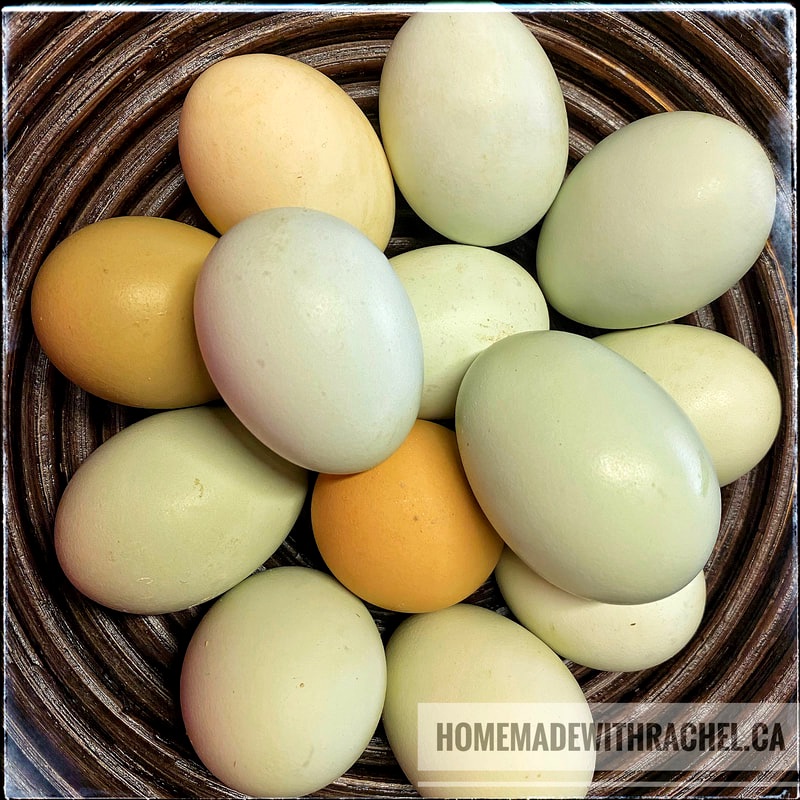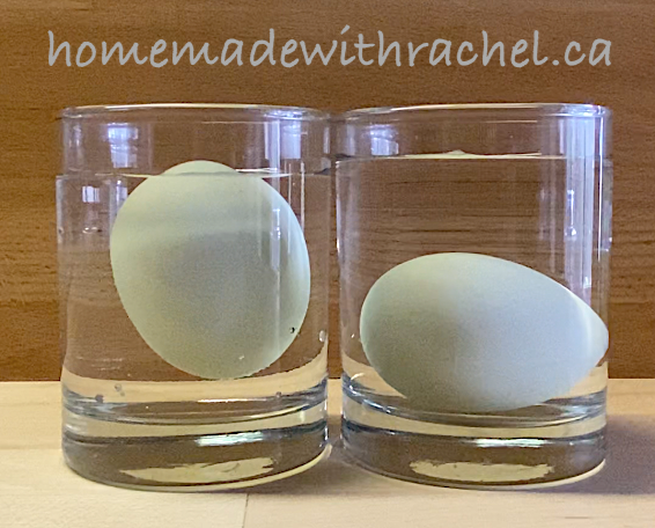|
I am fortunate to have access to local farm fresh eggs. There isn’t a date stamped on them, but I am certain of their peak freshness. However, to check for freshness, there are a few simple methods. One of them is the water test. It is one of the easiest and most accurate test for checking freshness. Please note that the float test does not determine whether an egg has gone bad, but it provides a useful indication of the age of an egg. Place the egg in a drinking glass or small bowl (use a larger vessel, if checking for several eggs. Fill the glass or bowl with water. If the egg sinks to the bottom, laying on its side horizontally, it is very fresh. If it tilts upwards vertically, and is fully submerged, but floats halfway below the surface, it’s a few weeks old and still good to eat. If it floats to the surface of the water, they are no longer fresh. The higher the egg floats, the older. Again, this is by no means an indication of whether the egg is good or bad. Why the Float Test Works The science behind the float test is based on the small air pocket inside the egg and porous eggshell, which allow air to get through. As the egg ages, the small air pocket will increase in size as water evaporates, and is replaced by air. Fresh eggs have less air in them, so they sink to the bottom. When the air builds up inside the egg as it ages, this increases its buoyancy and it will float. When the air pocket becomes very large, the egg may float to the very top of the water. The egg float test method is to tell whether an egg is fresh or older. An egg can sink and still be rotten. The date on store-bought eggs is by no means an indication to throw out your eggs. It is usually good for several weeks past the stamped date. It is just an indication of freshness for shops' rotation stock. How old are eggs in the grocery store in Canada and the U.S.? Regulations in many jurisdiction allow commercial farms to ship up to thirty day-old eggs to the store. They can also be sold for up to 30 days after the date it was put in the carton. Therefore, store-bought eggs can be up to 2 months old before consumers purchase them. The good thing about not too fresh eggs is, when it comes to peeling hard-boil eggs, you'll want the upright ones, not the very fresh eggs! Why is that? With fresh days old eggs, the white membrane beneath the shell sticks tightly to it, making peeling the egg almost impossible. As it ages or the protective coat is washed off the shell, the egg becomes porous, begins to absorb air and loose some carbon dioxide contained in the albumen or egg white. This creates a void, which separates the membranes of the eggshell, thus making the shell easier to peel and also the reason why the float test works. How to Keep your Eggs Fresh.
When eggs are freshly laid, they gave blooms or cuticles, which are protective coatings sealing the entire egg. Isn’t Mother Nature wonderful? These coatings keep the eggs fresh as long as they are not washed. It is the first line of defence against infection. You can leave a freshly laid chicken egg out at room temperature for about a month before refrigeration. While you do not need to refrigerate freshly laid eggs, they will last longer. Note: Washed eggs do need to be refrigerated as the protective coatings may be washed off during the cleaning process, thus allowing bacteria to penetrate. Refrigerated eggs can last up to three months. Make sure you do not leave your washed and refrigerated eggs out at room temperature for more than 2 hours. In North America, Japan, and Australia, commercially farmed store-bought eggs are pasteurised, thus needing refrigeration, which kills potential pathogens, yet strips the eggs of its natural protection. In the UK, Europe and other parts of the world, the hens are vaccinated against salmonella, and the eggs are not required to go through extensive washing, hence the protective coating on the egg is safely intact. You will find eggs in Europe next to the canned goods rather than next to the milk. If you buy your eggs such as I do from local farmers, be sure to ask if the eggs need to be refrigerated. Commercial eggs take weeks to reach the consumer, so if you buy store-bought eggs, refrigeration is so much more important. Once chilled, an egg returning to room temperature may sweat, opening its pores, and potentially exposing the egg to bacteria. Washed or not, eggs do stay fresh longer when kept cold. However, unwashed eggs will keep the best. You also cannot beat the taste and nutrition value of unwashed backyard or local farm eggs from chickens left to pasture in nature.
0 Comments
Your comment will be posted after it is approved.
Leave a Reply. |
AuthorRachel conducts gardening, culinary and fermenting workshops/retreats at her home on 100 acres in Northern Ontario, Canada, where she lives in creative harmony with nature. Rachel’s mission is to ensure the wisdom of our ancestors is preserved for future generations. Archives
May 2021
Categories
All
Images ©2002-2023 Rachel Thoo |
Site powered by Weebly. Managed by Web Hosting Canada


 RSS Feed
RSS Feed